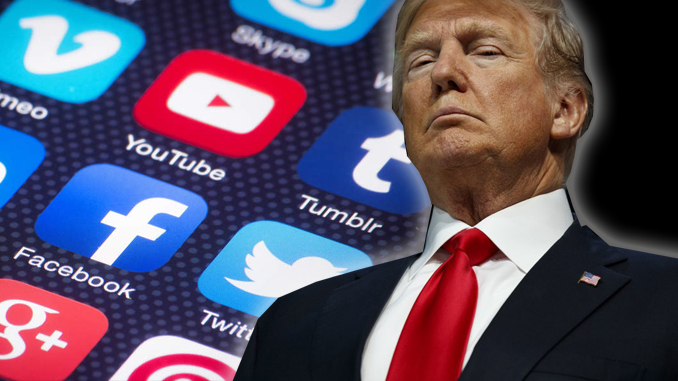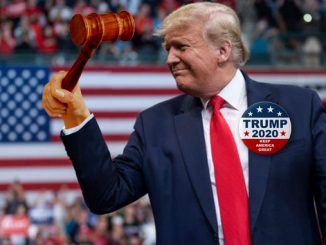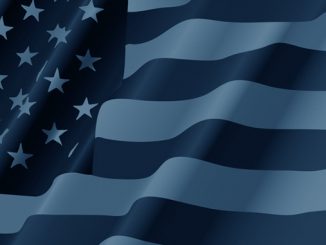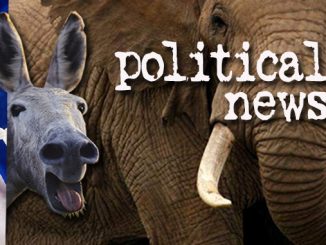
President’s executive order declares war on thought censors’ internet monopoly.
By Dr. Kevin Barrett
President Trump’s first term has disappointed some of his most ardent supporters. If Trump is really trying to “make America great again” by ending the empire and restoring the republic, he isn’t succeeding. The military-industrial-intelligence complex keeps growing. Organized crime, including drug dealing and pedophilic sexual blackmail by both domestic and foreign intelligence agencies, is getting stronger. The worst extremists in Israel have more clout in Washington than ever. Our economy has imploded—and the keys to the kingdom, along with $6 trillion, have been handed to Kosher Nostra operatives Larry Fink and Steve Mnuchin. Immigration and automation are still pushing ordinary working Americans up against the wall. Domestic unrest and polarization are out of control. And the odds of a disastrous war, whether with Iran or China or even Russia, are growing.
What has Trump actually done to solve our most pressing problems? Until recently, there was no obvious answer. The best that could be said was that Hillary might have blown up the world . . . and Trump hasn’t, yet. That, by itself, is not a very good re-election platform.
But suddenly, in the midst of a coronavirus crisis that seems tailor-made to deny him re-election, Trump finally made a bold and brilliant move: He declared war on the internet monopolies. On Thursday, May 28, Trump issued an Executive Order on Preventing Online Censorship. It begins:
Free speech is the bedrock of American democracy. Our Founding Fathers protected this sacred right with the First Amendment to the Constitution. The freedom to express and debate ideas is the foundation for all of our rights as a free people.
In a country that has long cherished the freedom of expression, we cannot allow a limited number of online platforms to hand-pick the speech that Americans may access and convey on the internet. This practice is fundamentally un-American and anti-democratic. When large, powerful social media companies censor opinions with which they disagree, they exercise a dangerous power. They cease functioning as passive bulletin boards, and ought to be viewed and treated as content creators.
Trump’s executive order:

Clarifies . . . the immunity from liability created by section 230(c) of the Communications Decency Act (section 230(c)). 47 U.S.C. 230(c) . . . the immunity should not extend beyond its text and purpose to provide protection for those who purport to provide users a forum for free and open speech, but in reality use their power over a vital means of communication to engage in deceptive or pretextual actions stifling free and open debate by censoring certain viewpoints.
Trump’s order formally deems big social media sites “the modern public square” that “should not restrict (constitutionally) protected speech.” If Facebook, Twitter, YouTube or any other segment of today’s public square violate Trump’s order (and the Constitution) by censoring protected speech, they will henceforth be deemed publishers with full responsibility for every item they publish. Instead of a public square where anyone can post anything unless it is illegal, they will become like a newspaper that vets its letters to the editor and decides which ones it will publish. Like a newspaper, Facebook, Twitter, and YouTube can and will be sued if they publish any “letters” (posts) that are libelous or otherwise legally actionable. That means they will have to hire millions of editors to pre-screen every post. They will quickly go out of business and be replaced by new platforms that follow the Constitution, and Trump’s executive order, by letting users post whatever they want—as long as it is constitutionally protected speech.
The dominant anti-Trump wing of the mainstream media has greeted Trump’s order with howls of outrage. But their arguments are weak. They claim that since Facebook is a private company, Zuckerberg’s right to free speech, and to censor everyone he doesn’t like, trumps the rights of Facebook users. But that is not true, because Facebook is not a publisher, it is a platform for users. Section 230 made that distinction abundantly clear decades ago. Trump’s order simply restores Section 230’s original meaning and intention.
Most of the arguments against Trump’s order are fallacious, and some are even mendacious. The only one that might seem reasonable on its face is the claim that the courts have held pornography to be protected speech, so do we really want to force social media to host pornography? The rebuttal, of course, is that no court has held pornography to be protected to the same extent as political, philosophical, religious, and other intellectual speech. So just as a pornographic display in the town square is not constitutionally protected, neither is pornography in the digital town square. Likewise, incitement, libel, fraud, obscenity, threats, and commercial infringement are not protected.
Bottom line: Trump is right. Social media must obey the Constitution.
Kevin Barrett, Ph.D., is an Arabist-Islamologist scholar and one of America’s best-known critics of the War on Terror. From 1991 through 2006, Dr. Barrett taught at colleges and universities in San Francisco, Paris, and Wisconsin. In 2006, however, he was attacked by Republican state legislators who called for him to be fired from his job at the University of Wisconsin-Madison due to his political opinions. Since 2007, Dr. Barrett has been informally blacklisted from teaching in American colleges and universities. He currently works as a nonprofit organizer, public speaker, author, and talk radio host. He lives in rural western Wisconsin.




